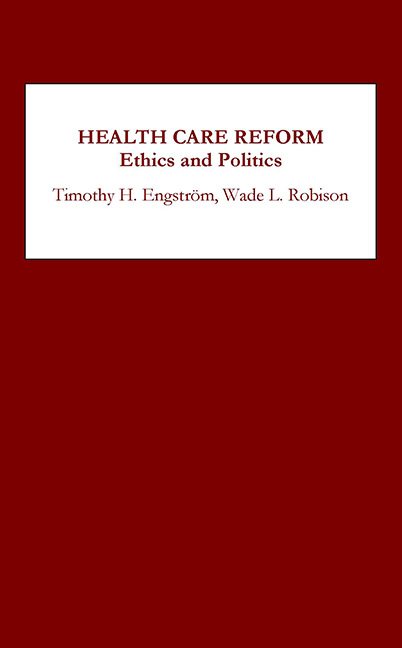Book contents
- Frontmatter
- Dedication
- Contents
- Foreword
- Preface
- Introduction: The Problems of Health Care Reform
- Part One Moral Commitments of Our Present System
- 1 The Moral Crisis in Health Care
- 2 Ethics, Justice, and Health Reform
- Part Two Moral Implications of Market-Driven Reform
- Part Three Ethical and Political Implications of International Comparisons
- Part Four Argument for Universal Principles of Health Care
- Conclusion: Prospects for Reform
- Notes on the Contributors
- Index
1 - The Moral Crisis in Health Care
from Part One - Moral Commitments of Our Present System
Published online by Cambridge University Press: 25 October 2017
- Frontmatter
- Dedication
- Contents
- Foreword
- Preface
- Introduction: The Problems of Health Care Reform
- Part One Moral Commitments of Our Present System
- 1 The Moral Crisis in Health Care
- 2 Ethics, Justice, and Health Reform
- Part Two Moral Implications of Market-Driven Reform
- Part Three Ethical and Political Implications of International Comparisons
- Part Four Argument for Universal Principles of Health Care
- Conclusion: Prospects for Reform
- Notes on the Contributors
- Index
Summary
Moral Problems
In the midst of the Clinton administration's efforts to reform health care, Senator Dole claimed that there was no crisis in health care and that all that was needed is some “fine tuning.” Senator Daniel Patrick Moynihan conceded that on “health care costs, you've got a crisis,” but claimed there was no other major problem. Both those assessments were woefully inadequate to the problems we faced then and would be even more inadequate now.
In his Dialogues Concerning Natural Religion, David Hume says that
Were a stranger to drop, in a sudden, into this world, I would show him, as a specimen of its ills, an hospital full of diseases, a prison crowded with malefactors and debtors, a field of battle strowed with carcases, a fleet floundering in the ocean, a nation languishing under tyranny, famine, or pestilence.
Hume is arguing that no rational objective observer, seeing the world with fresh eyes, could reasonably infer from what is perceived in this world that it was designed by an all-good, all-knowing, all-powerful being.
Similarly, were a stranger to drop into this world and look at our health care system, he or she would be hard-pressed to know what to infer from what is perceived. If someone were to suggest that it were designed, such a stranger should be puzzled: What is it designed for? Is it meant to provide health care to the citizens of the country? But then why are so many excluded from basic care? Is it meant to ensure that those who are born survive? Then why is the infant mortality rate so much higher than the rates of other industrialized countries? Is it meant to make the lives of those who are covered healthier so that they have less need for medical intervention? But then why are so many of the resources of the system directed toward relief from suffering rather than prevention, and why is so much spent so late in one's life? “You have so much money to spend on health care,” this stranger would say, “but if your aim is prevention, why is almost a third of the money spent on a person's health spent in the last year of the person's life?
- Type
- Chapter
- Information
- Health Care ReformEthics and Politics, pp. 13 - 39Publisher: Boydell & BrewerPrint publication year: 2006

